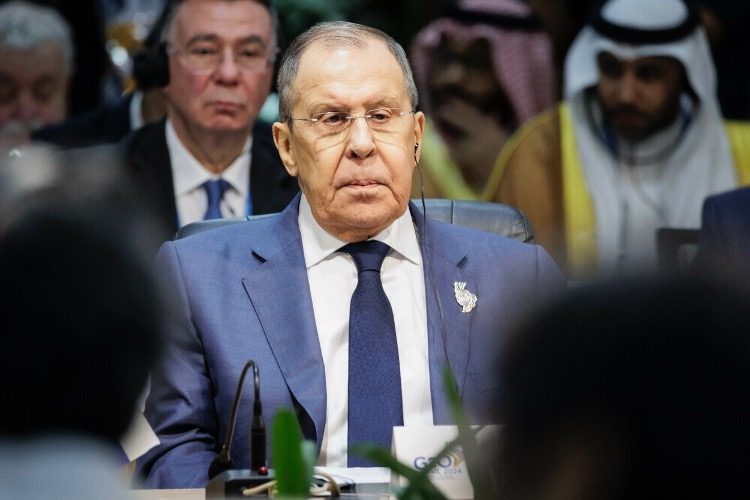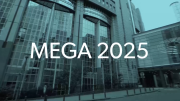
On February 20, Russian Foreign Minister Sergey Lavrov told Brazilian media that Russia is interested in policies, not personalities, and does not think the United States intends to change its hostile stance toward Russia regardless of who wins the November presidential election.
The top diplomat was asked whether Moscow preferred a return of Donald Trump to the White House next year over President Joe Biden staying in office. The interviewer from the Globo media group cited opinions that a new Trump presidency would make it easier to end the Ukraine conflict.
“The ruling elites in the US consider Russia an enemy and a threat regardless of their political affiliation,” Lavrov said.
While Biden “did nothing” in four years to boost relations with Russia, “we do not delude ourselves into expecting the anti-Russian course of the US to change anytime soon,” the minister added.
Rumors over which presidential candidate is a “favorite” of Moscow have been part of U.S. electoral cycles for decades. The ongoing race, in which Biden and Trump are expected to be nominated by their respective parties, is no different.
Allegations that President Trump was backed by Russia and beholden to it, which formed the Democratic Party’s explanation of why Hillary Clinton lost to him in 2016, undermined his administration. Contrary to what his critics claimed, some of the Republican’s actions at the helm contradicted such accusations, such as his decision in 2017 to supply weapons to Ukraine.
On February 14, Russian President Vladimir Putin said to journalist Pavel Zarubin on the sidelines of the Future Technologies Forum in Moscow that he hoped that Joe Biden would win the U.S. election.
When asked who would be better for Russia, the incumbent Biden or his Republican challenger Trump, Putin answered unequivocally.
“Biden. He is a more experienced and predictable person, he is a politician of the old sort. But we will work with any leader who gets the confidence of the American people,” he said.
Putin replied to the media reports about Biden’s cognitive decline by saying he did not notice it when he met with the U.S. leader in Switzerland three years ago.
“So what if he whacked his head coming out of a helicopter? Who among us hasn’t hit his head on a helicopter, let him cast the first stone,” Putin said. “I am not a doctor.”
Per the Russian president, the only thing that matters to Moscow is Washington’s policy, which he described as “harmful and mistaken.”
Putin also commented on the recent remarks by Trump concerning certain NATO members who were not committing as much of their GDP to the military as the bloc requires.
Trump’s approach to NATO “has a certain logic,” Putin said, but so does the position of European countries used to living under the U.S. “nuclear umbrella” with no questions asked. NATO “is an instrument of U.S. foreign policy,” and if the United States decides it no longer has use for it, that’s Washington’s prerogative, Putin said. “Let them sort it out themselves.”
Also, the U.S. intelligence community inappropriately used foreign allies to target Trump’s campaign to set up the “Russiagate” conspiracy ahead of the 2016 election, according to three investigative journalists.
Michael Shellenberger, Matt Taibbi, and Alex Gutentag — of “Twitter Files” fame — published the first part of an investigation on February 13 in which they claimed the so-called Five Eyes nations were operationalized against Trump staffers, citing anonymous sources close to the House Intelligence Committee.
Per their report, Obama CIA Director John Brennan had sent America’s partners — the U.K., Canada, Australia, and New Zealand — a list of 26 Trump associates to target with data collection, misinformation, and manipulation.
The Russiagate conspiracy involved multiple failures across western media networks to critically assess U.S. intelligence claims that Russia had interfered in the 2016 U.S. presidential election. A 2018 Pulitzer prize was awarded to Washington Post and New York Times journalists for their reporting on what was later exposed as a false story.
“They were making contacts and bumping Trump people going back to March 2016,” said a committee source. “They were sending people around the UK, Australia, Italy — the Mossad in Italy. MI6 was working at an intelligence school they had set up,” the journalists posited.
Officially, the FBI only started looking into the Trump campaign that summer, after an Australian diplomat reportedly overheard an aide mention Russia. If confirmed, these findings would show that the U.S. intelligence community had worked for months before that to set up just such a pretext.
In a statement to the investigative journalists, the FBI said it had made “missteps” in the 2016 and 2017 investigation of the Trump campaign, but has since implemented reforms to prevent it from happening again.
“The allegations that GCHQ was asked to conduct ‘wiretapping’ against the then president-elect are nonsense,” a spokesman for the British surveillance agency said. “They are utterly ridiculous and should be ignored.” Shellenberger, Taibbi, and Gutentag said they had never asked the GCHQ about “wiretapping.”
According to Shellenberger, there is a “10-inch binder” containing previously unknown documents about the intelligence community’s surveillance of the Trump campaign. The 45th U.S. president had ordered these documents declassified, but they went missing instead. In a Fox News appearance on February 13, Shellenberger claimed that the FBI’s August 2022 raid on Trump’s Mar-a-Lago resort might have been linked to the missing binder.
After the U.S. intelligence community created a pretext for investigating Trump for “ties to Russia,” they spied on his campaign — and then his presidency — using a falsely obtained FISA warrant. This warrant was premised on the “Steele dossier,” a file compiled by a British spy in the pay of Hillary Clinton’s campaign, through several intermediaries. The FBI knew the dossier was fraudulent as early as January 2017, but continued using the FISA warrant for almost a year thereafter. The FBI lawyer who altered evidence to obtain the warrant, Kevin Clinesmith, ended up sentenced to probation, but his law license has since been restored.



